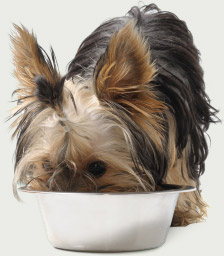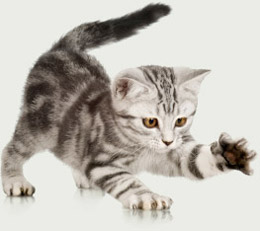Safety tips for dogs and cats
Pet Health on October 2, 2011. Last modified on April 14, 2020. Read disclaimer.
If you're in the majority (63%) of American households that have at least one pet, you're probably aware of the many physical and emotional health benefits that pets provide for their owners:
- lower blood pressure
- reduce stress
- prevent heart disease
- provide faithful companionship and a sense of security
- visit the doctor less often -- especially for non-serious conditions
- decrease depression and loneliness
How much thought, however, do you give to the health and safety of your pets? According to the Center for Veterinary Medicine, many of us are unfamiliar or unaware of potential dangers to our pets that are all around us.

Safety regarding pet feeding
- Just like humans, dogs and cats harbor bacteria in their mouth and these bacteria get transferred to food and water dishes. Food left in the bowls feeds this bacteria, which can result in illness for the pets as well as for humans that handle the bowls. So, food bowls should be washed between feedings and water dishes washed daily, or every other day.
- Moist leftovers should be kept in a sealed container in the refrigerator.
- Pet food storage containers should be washed and dried before refilling. Keep storage containers tightly sealed.
- Humans should wash their hands after handling pet dishes.
Household items that can be dangerous for dogs and cats
Particularly dangerous for dogs are:
- Chocolate: containing the compound (in the same family as caffeine) that is toxic to dogs. Depending on the type of chocolate (semisweet, dark, milk, etc.) as well as the weight and sensitivity of the dog, eating just a small amount has the potential to be fatal. If you believe that your dog may have eaten chocolate, call your vet immediately! Symptoms of chocolate poisoning in dogs may include vomiting, diarrhea, rapid heartbeat, restlessness, spasms or seizures.
- Bones and Jerky Pet Treats: Regardless of the size of the bone or the dog, bones should never be offered to canines. They can easily cause broken teeth, bloody mouth or tongue injuries, block the windpipe or stomach tube, cause constipation from sharp bone shards that scrape the dog's intestines... and even death. As for other chew treats such as rawhides, jerky, etc., never give them unsupervised. It is not uncommon for a dog to gulp down too large of pieces, causing the treat to get stuck in the windpipe (causing frantic behavior, drooling or coughing), stomach tube or in the stomach itself (where the life-threatening problem can progress for days if untreated). Also, excessive amounts of these chew treats can be very difficult for your dog to digest.
- Xylitol: an artificial sweetener often found in sugar-free gums, candies, baked goods, toothpaste and mouthwash. Vomiting usually begins quickly and can progress to seizures, collapse, liver failure and death. As is the case with chocolate, some dogs are more sensitive than others to xylitol.
- Alcohol: Though it may be done in good fun, to share that cup of eggnog, wine or beer with your dog, alcohol consumption by dogs can result in vomiting, diarrhea, weakness, breathing difficulty, tremors and even coma and suffocation.

Particularly dangerous for cats are:
- Lilies (commonly found indoors around Easter time): Every part of the lily plant (flower, leaf and pollen) is toxic for cats and ingestion can cause kidney damage -- so early veterinary care is critical. Symptoms may include vomiting, loss of appetite or decrease in activity level. Other household plants of particular concern are poinsettias, mistletoe and holly (all of which are common around Christmas time), aloe vera, chrysanthemums.
- Strings, ribbons and tinsel: Cats love playing with wiggly, sparkling objects but, if swallowed, any of these items can become tangled inside the cat's stomach and cause life-threatening, intestinal damage and infection. Symptoms of vomiting, diarrhea, lack of appetite, or lessened activity level may appear in as little as a few hours or as delayed as several days.
Other human foods that can be dangerous for dogs and cats:
- Avocado
- Coffee
- Fruit pits
- Garlic and onions
- Grapes and raisins
- Macadamia nuts
- Raw yeast products (such as raw bread dough)
Other common household items of concern:
- Human and veterinary medications (including over-the-counter medications)
- Antifreeze, fertilizers and ice melting products
- Fabric softener sheets
- Insecticides and rodent poisons
- Bleach, detergents, toilet bowl cleaners
- Liquid air fresheners and potpourri
- Swimming pool chemicals
When you consider that pet cats routinely live 15-16 years and dogs around 13 years (though this varies dramatically by breed, size and weight), we owe it to our pets to look out for them -- just as we would do for any dear friend. To learn more pet health and safety tips, visit:
http://dnr.wi.gov/wnrmag/html/stories/2008/feb08/creature.htm
http://www.aspca.org/pet-care/poison-control/top-10-pet-poisons-of-the-year.aspx
https://www.fda.gov/AnimalVeterinary
